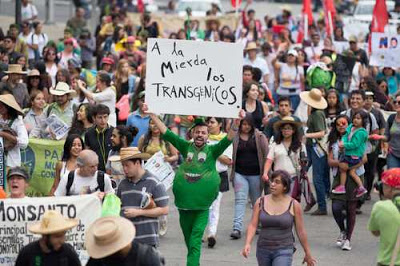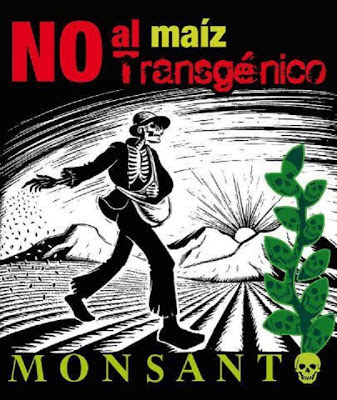
contra la trasnacional Monsanto. Photo by Pablo Ramos.
Moderator’s Note: We have been waiting for news on this important case, the latest, and perhaps the last, in a ten-year campaign by Monsanto and its allies to impose transgenic maize products on Mexico. Due process in Mexico is a tangled and lengthy juridical process and Monsanto has exploited the ‘amparo’ rights clause of the Mexican Constitution to prolong and intensify its attacks on Indigenous and peasant farmers. These are the farmers who sustain the living seed libraries of the vital Mesoamerican Vavilov Center of Origin and Diversification of corn among more than three dozen other native crops that literally feed the world.
This attack continued through the means of repeated challenges to successful court decisions and rulings verifying the legality of the ban on genetically engineered corn, soy, and other transgenic crops. The underlying rationale of the anti-GMO movement in Mexico has always been premised on the principle of the right of Indigenous and peasant farmers to protect Mexico’s unique status as the center of origin and diversification of maize and its wild relatives and intermediaries (e.g., Zea diploperennis). The benefits of this fact are said to outweigh those associated with free trade and commercialization of GMOs which come with serious environmental, socioeconomic, and cultural impacts.
In the latest ruling, issued earlier today, Mexico’s Supreme Court refused to review an appeals court decision from 2013, which in effect will allow the appeals court to verify the suspension of permits for the planting of GE corn grain and uphold the enforcement of the ban throughout the country. The original decision included a declaration that the benefits of GMO corn remain unproven.
I am posting my translation of a report on the ruling written by Angélica Enciso and Gustavo Castillo for the Mexican newspaper, La Jornada, who broke the story earlier this morning. This is a major substantive victory for the anti-GMO movement in Mexico with huge implications globally. Efforts like this will continue to spread across the globe, including, I hope, north of the border into the centers of origin and diversification of our beloved Turtle Island Corn Belt in the USA.
SCJN rejects Monsanto ammunition on transgenic maize
THE APPEALS COURT HAD RULED THAT THE BENEFITS OF THESE PRODUCTS ARE UNCERTAIN
Angélica Enciso and Gustavo Castillo
Newspaper La Jornada
Friday, May 12, 2017, p. 38
The first chamber of the Supreme Court of Justice of the Nation (SCJN) refused to review or analyze an amparo promoted by the company Monsanto, with which the multinational intended that the maximum court of the country pronounce on the final status of the issuance of commercial permits for the sowing of transgenic maize.
In this way, the decision to resolve this trial involving the companies Monsanto, Dow, Pioneer and Dupont, as well as the secretariats of the Environment and Agriculture, and on the other hand, the civil society and academic organizations that are opposed to the marketing of transgenic maize, will have to be resolved by the first collegiate court in civil matters.
This review case began last January, when the collegial court was about to issue a ruling on whether to maintain the precautionary measure imposed in September 2013, which banned the authorizations for transgenic maize plantings pending resolution of the problem. Demand of collective action that organizations presented that year. On January 26, the court suspended the vote on the resolution because Monsanto had submitted the petition to the SCJN and should await the determination of this instance.
The lawyer of the Corn Collective, René Sánchez Galindo, explained that last Wednesday in a private meeting, the Supreme Court justices evaluated the appeal that Monsanto filed. None of the justices endorsed the company’s request, which is a requirement for the Court to place it on iys docket, as individuals cannot impose these requirements.
Galindo considered that the arguments of the company—that transgenic maize is not harmful to health and the environment—are repetitive and reiterate what the companies Dow, Pioneer and Dupont said in another 22 lawsuits for amparo. He recalled that the appeals court ruled, inter alia, that the benefits of transgenics are uncertain. This phrase was not contested by the company which has not shown the economic benefit of those products.
The suspension of planting transgenic maize has been in force throughout the country by a court decision for three and a half years, after a group of organizations, academics and citizens presented a collective action against the planting of transgenic maize in Mexico.
 In that year (2013) the federal government was about to give commercial permits for the cultivation of these products, but District Court 12 determined that the government should set as a precautionary measure the suspension of the issuance of planting permits to companies [until the courts could consider the scientific and economic metrics –brackets added].
In that year (2013) the federal government was about to give commercial permits for the cultivation of these products, but District Court 12 determined that the government should set as a precautionary measure the suspension of the issuance of planting permits to companies [until the courts could consider the scientific and economic metrics –brackets added].
This original measure was decided based on considering the risk of environmental damage with the cultivation of transgenic maize. The companies that had submitted applications for commercial planting permits determined to challenge the resolution.
Since then, both the Environment and Agriculture secretariats and the companies have filed about 100 challenges, including 26 amparo trials, 16 review appeals, 15 complaints, seven revocations and seven challenges to the admission of the complaint, According to the organization Seeds of Life.
After surpassing all those challenges, the trial of the lawsuit began in May 2016, with the judicial determination to maintain the suspension of the cultivation of the transgenic maize.
